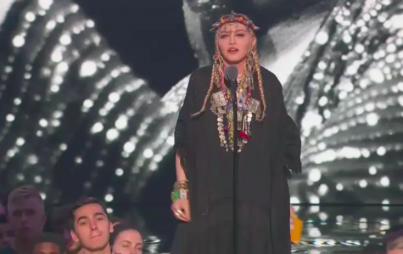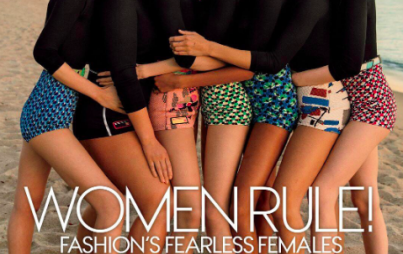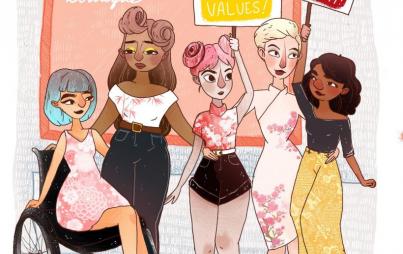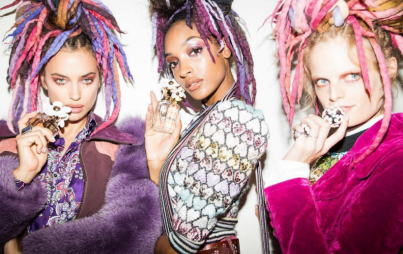
Who knew Coachella fashion could cause such a spirited intellectual debate?
When a slew of starlets—Vanessa Hudgens, Selena Gomez and Kendall Jenner among them—wore South Asian bindi head decorations to Coachella this year, it launched the latest iteration of a long-simmering debate about cultural re-appropriation.
Was it insensitive for the celebs to casually wear an accessory of sacred importance to South Asian culture? Or are people overreacting to an innocent fashion statement connected to a symbol that's been long-stripped of its spiritual meaning in South Asia? Surprise, surprise: it depends on who you ask.
This isn't, of course, the first time a celeb has stirred debate with offensive/maybe not offensive appropriation. Gwen Stefani caused a fuss a few years ago when she dressed four sexed-up Japanese dancers in schoolgirl outfits and called them her "Harakuju Girls," naming them after a city in Tokyo. Katy Perry has been similarly keen on appropriating feminine Japanese culture, even dressing up as a geisha at the AMAs. And of course, we mustn't forget (though I'm sure we'd all like to) the bright new dawn of the Miley twerk.
Every time the issue comes up, there are a lot of arguments and counterarguments and counterarguments to the counterarguments, with no one able to agree on anything. And the reason for this is simple: cultural appropriation is crazy-complicated.
Which means, of course, that we're ready to tackle it head on! So let's get to it.
Appreciation vs. Appropriation
Most can agree that it's not always wrong to take something from a different culture. If that were true, we wouldn't have all kinds of amazing international cuisine or music, not to mention yummy green tea, beautiful turquoise jewelry or—horror of horrors!—karaoke...and what kind of sick-sad world would that be? Yet most can agree it's sometimes wrong to do so. So where do we draw the line? What makes something cultural appreciation (A-OK!) vs. cultural appropriation (oh hell no!)
First, an interesting fact: "cultural appropriation" was first coined relatively recently, initially appearing in the late 1980s and early 1990s. And while most scholars can agree it has to do with taking an artifact, ritual or symbol from another culture, specific definitions vary wildly. There are even different subgenres of appropriation. Whew!
It's head-spinning stuff, and can feel next-to-impossible to decipher. A couple years ago, Jezebel wrote up a "much-needed" primer advising people to use source, significance (or sacredness) and similarity to discern if an object had been appropriated—a thorough formula, but frankly way too complex and nuanced for even the most progressive among us to mentally endure.
Here's an easier barometer to use: Is the item being used in a stereotypical way?
Both Gwen Stefani and Katy Perry have used Japanese culture to play up come-hither femininity, which taps into a long-held stereotype that Asian women are sex-ready giggling girly-girls. Similarly, Miley Cyrus took twerking and turned it the equivalent of semi-nude dance-porn, emphasizing the stereotype of raw, aggressive sexuality in African-American culture.
All these instances differ from, say, wearing a necklace made of Native American turquoise, singing karaoke or taking a belly-dancing class—yet another recent entry in the canon of cultural appropriation debates. In these and other cases, the cultural item is being enjoyed without a subtext of stereotyping.
So What About the Bindi?
By this measure, the Coachella bindi brigade does qualify as offensive, though perhaps not to a Gwen or Miley degree. Keep in mind that Hudgens, Gomez and Jenner wore their bindis to a drug-fueled music show and used them to complete very specific faux-hippie sexed-up looks. They tapped into the stereotype that South Asia is a mystical, free-love, drug-fueled wonderland where everyone sits around cross-legged chanting peace, love and Jai Guru Deva ommmmmmm.
It's also worth noting that all three of these women already annoy people to begin with, because of their youth and perceived entitlement/lack of talent, which aggravates our conception of them as ignorant and insensitive. (That's how many feel about Katy, Gwen and Miley, too.)
So our reaction to appropriation is also tied up in who's doing the appropriating. See: complicated stuff!
At the very least, can we all agree that karaoke should—definitely—stay? (Jury's still out—and fist-fighting—about kimonos, dirty dancing, bindis and people-as-props.)
Image: SharonaGott/Flickr






